Androscoggin people
The Androscoggin were an Abenaki people of what are now the U.S. states of Maine and New Hampshire. It is assumed that by the 18th century, they had been absorbed by neighboring tribes.

Name
Arosaguntacook or Arossagunticook, the tribe's endonym, in the eastern Abenaki language means "Rocky Flats flow" or "a river of rocks refuge." Other recorded variations of the name are Amariscoggin, Ameriscoggin, Asschincantecook, Arossagunticook, Alessikantek-eyak by the Penobscot and the Cowasuck. The name Arosaguntacook was probably changed by Massachusetts Governor Edmund Andros to Androscoggin. Today's Penobscot name for the Saint Francis Abenaki is Alessikantek-eyak because Arossaguntacook belonged to the ancestors of the people of Saint Francis.
Distribution
The Arosaguntacook once lived in the Androscoggin River watershed, located in present-day southern Maine and northern New Hampshire. Their main village was located in the vicinity of present-day Lewiston. Together with the Pigwacket, they formed the southernmost of the Abenaki tribes, and were therefore one of the first in contact with the English colonists of New England.
History
In 1675, the Androscoggin took part in King Philip's War. Metallak was a member of the Androscoggin tribe.
References
- Bruce G. Trigger (ed.): Handbook of North American Indians. Vol. 15. Northeast. Smithsonian Institution Press, Washington D.C. 1978 ISBN 0-16-004575-4
Maps
Maps showing the approximate locations of areas occupied by members of the Wabanaki Confederacy (from north to south):
 Mi'kmaq
Mi'kmaq
 Eastern Abenaki (Penobscot, Kennebec, Arosaguntacook, Pigwacket/Pequawket)
Eastern Abenaki (Penobscot, Kennebec, Arosaguntacook, Pigwacket/Pequawket) Western Abenaki (Arsigantegok, Missisquoi, Cowasuck, Sokoki, Pennacook
Western Abenaki (Arsigantegok, Missisquoi, Cowasuck, Sokoki, Pennacook
External links
- Abenaki History
- Koasek Traditional Band of the Abenaki Nation
- St. Francis/Sokoki Band of the Abenaki Nation
- Starbird, Charles M. The Indians of the Androscoggin Valley: Tribal History, and their Relations with the Early English Settlers of Maine (1928). University of Southern Maine Digital Commons.
- List of Native American peoples in the United States